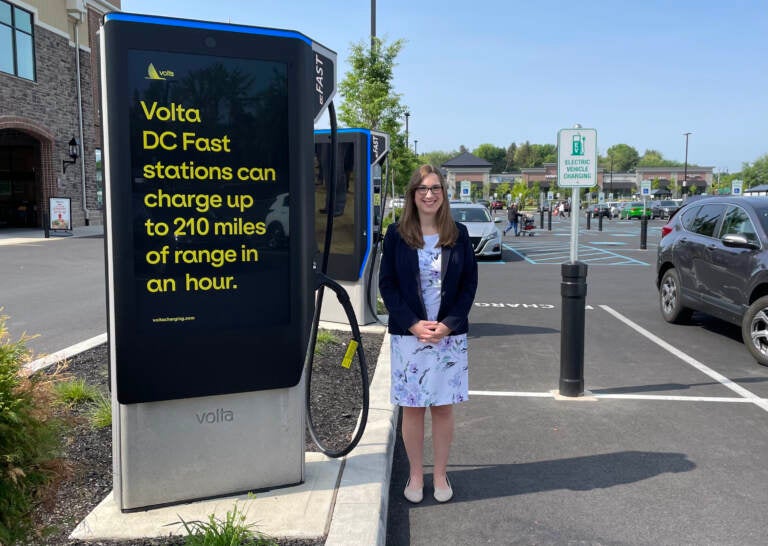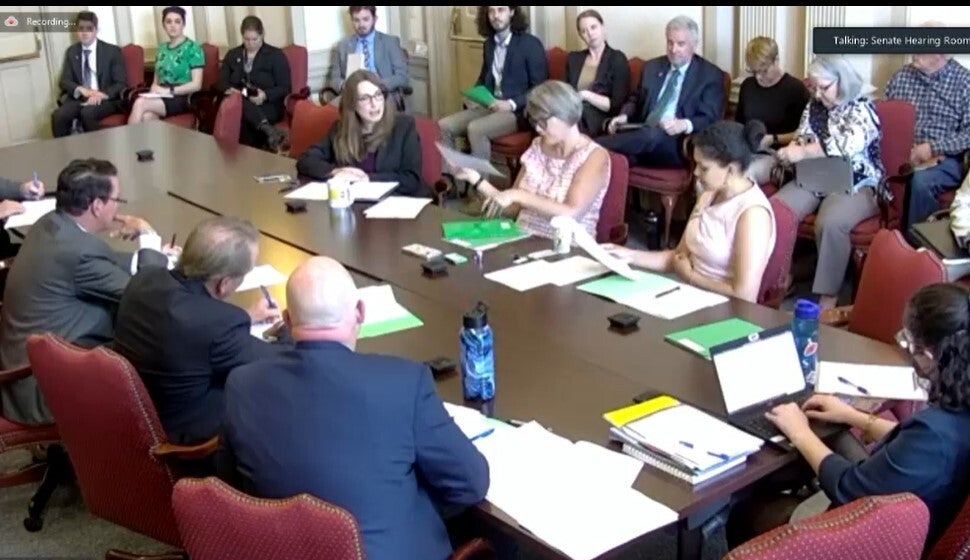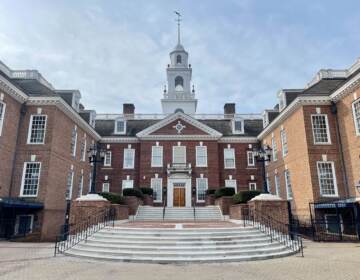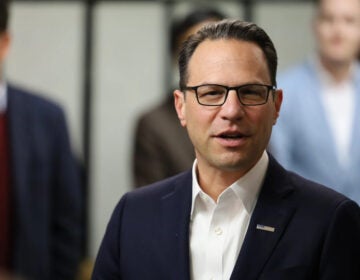New Delaware homes would have capability to charge electric vehicles under Senate bill
The measure piggybacks off one already in effect in the state’s most populous county. Even skeptics say it saves consumers thousands of dollars in upfront costs.
Listen 1:31
State Sen. Sarah McBride stands next to an electric vehicle charging station outside Wegman's near Wilmington. Her bill will help more EV owners power up at home. (Courtesy of Sarah McBride)
This story is part of the WHYY News Climate Desk, bringing you news and solutions for our changing region.
From the Poconos to the Jersey Shore to the mouth of the Delaware Bay, what do you want to know about climate change? What would you like us to cover? Get in touch.
New Castle County, where more than half of Delaware’s roughly one million residents live, mandated last year that all new homes have the infrastructure — wiring, conduit, and junction box — to install the equipment needed to charge electric vehicles.
Already, more than 700 new homes in the state’s northernmost county have been built to that standard, known as EV-capable.
Constructing a home that way saves buyers of electric vehicles hundreds or thousands of dollars in the upfront costs needed to power up their car, SUV, or truck at home.
Now, Wilmington-area state Sen. Sarah McBride wants to take the initiative statewide and include Kent and Sussex counties.
Her bill to have all new single-family homes be EV capable has cleared a Senate committee and she expects passage on the floor in the next few weeks. Then, the House will take up the measure. Should it become law, it would take effect in January.
Her bill also would require that new apartment and condominium complexes put EV charging stations in 5% of parking spaces and that another 10% must be EV-capable. That would take effect in January 2025.
The bill comes as the state environmental secretary is deciding whether to decree that all new vehicles delivered to Delaware in 2035 be electric in a gradual increase that would start with 35% of 2026 models being EVs.
For McBride, it’s a no-brainer to put chargers where people live, starting immediately. A separate bill she is sponsoring would require the state to assess the availability of residential charging stations statewide and develop plans to put in more around existing dwellings.
“The reality is that the shift to electric vehicles is not ideological, it’s imminent, and it’s inevitable,’’ McBride told WHYY News. “And regardless of what one thinks about electric vehicles, regardless of whether one intends to buy an electric vehicle, the market has made clear that the inventory of vehicles in this country is moving electric.”
“The market share of vehicles that are electric is going to grow in the years to come. Whether that is 30%, 50%, or 100%. There are going to be more electric vehicles on the road. And so as policymakers, we have to make sure that we’re pursuing responsible, and at minimum, modest proposals to better prepare for this shift.”
‘It can save thousands of dollars from a retrofit in the future’
The legislation received support from both environmental and business groups during the Senate Environment, Energy, and Transportation Committee last week.
John Irwin of the Sierra Club’s Delaware Chapter said the transition to electric cars is critical to reducing greenhouse gas emissions that are driving the global climate crisis. He said many homeowners will want an EV-capable home.
“Automakers have already committed to making these changes. So we need to begin implementing the infrastructure that this new technology requires,’’ Irwin said. “A key part of it is the at-home charging capability that will be used by most people.”
“We know where we’re headed. Why not put this in every house? Every new building should be set up so it’s ready. It can save thousands of dollars from a retrofit in the future.”
Katie Gillis, executive officer of the Builders and Remodelers Association of Delaware, said it’s not cost-prohibitive.
“We are very concerned about housing affordability, but we believe that this doesn’t add too much’’ to the expense of construction costs, Gillis said.
Lobbyist Scott Kidner of the Delaware Apartment Association said some complex owners are already doing what the legislation would mandate. He said others worry that they would have to re-do plans that have already been submitted and approved.
McBride said she’s willing to work with affected parties to forge compromises, saying amendments for “technical changes” will be considered on the floor.
‘We’re going to overload the system that can’t maintain itself’
The Democrat-sponsored bill received only slight pushback during the committee hearing from Republicans such as Sen. Dave Lawson of Kent County.
Lawson says he’s sure the Democrat-dominated Senate and House will approve the bill that is supported by Democratic Gov. John Carney. Though not a fan of such mandates, Lawson said he might even vote for it himself because he’s not against the practical move of wiring homes for people who want electric cars.
“From a construction standpoint, it makes sense,’’ Lawson said. “It’s a few hundred dollars to put the conduit in. It’s several thousand dollars to retrofit. I get that. I understand that totally. And I have no problem with setting a home up to do that.”

Though the Delaware Electric Cooperative that supplies much of Kent and Sussex counties expressed support, Lawson said his ongoing concern is the electric grid and where power will come from to support a growing fleet of EVs.
“On a hot day, we’re just hanging on. So, I can’t imagine what’s going to happen when we put all these EVs in,’’ Lawson said. “I don’t have a problem with setting the homes up for it. I just have a problem with the ultimate end. How are we going to be able to do this? Look at California … they went all to green energy and now rolling brownouts or blackouts.”
Lawson said he fears that in Delaware, “we’re going to overload the system that can’t maintain itself.”

McBride believes the energy industry will adapt in America as it has done in other countries such as Norway, where most vehicles are powered by electricity.
She stressed that her intent, and that of the bill, is to help consumers and the state prepare for the inevitable, since most major car manufacturers, including Toyota and General Motors, have pledged to move to all-electric production.
“The most practical way to charge a vehicle is either where you work or where you live, places that you will be for at least several hours,’’ McBride said. “And for people who don’t work outside the home, for people who work remotely from the home, charging at their home might be really the only conceivable option that they have.”
And while she realizes that hundreds of thousands of existing Delaware dwellings aren’t yet equipped for the electric-powered driving future, McBride said that “at a minimum, we should stop the bleeding.”

Get daily updates from WHYY News!
WHYY is your source for fact-based, in-depth journalism and information. As a nonprofit organization, we rely on financial support from readers like you. Please give today.






